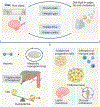Influence of sleep on physiological systems in atherosclerosis
- PMID: 39528718
- PMCID: PMC11567060
- DOI: 10.1038/s44161-024-00560-7
Influence of sleep on physiological systems in atherosclerosis
Abstract
Sleep is a fundamental requirement of life and is integral to health. Deviation from optimal sleep associates with numerous diseases including those of the cardiovascular system. Studies, spanning animal models to humans, show that insufficient, disrupted or inconsistent sleep contribute to poor cardiovascular health by disrupting body systems. Fundamental experiments have begun to uncover the molecular and cellular links between sleep and heart health while large-scale human studies have associated sleep with cardiovascular outcomes in diverse populations. Here, we review preclinical and clinical findings that demonstrate how sleep influences the autonomic nervous, metabolic and immune systems to affect atherosclerotic cardiovascular disease.
© 2024. Springer Nature Limited.
Conflict of interest statement
Figures




Similar articles
-
Sleep, Autonomic Nervous Function and Atherosclerosis.Int J Mol Sci. 2019 Feb 13;20(4):794. doi: 10.3390/ijms20040794. Int J Mol Sci. 2019. PMID: 30781734 Free PMC article. Review.
-
Cardiovascular autonomic dysfunctions and sleep disorders.Sleep Med Rev. 2016 Apr;26:43-56. doi: 10.1016/j.smrv.2015.05.005. Epub 2015 Jun 3. Sleep Med Rev. 2016. PMID: 26146026 Review.
-
Dynamic coupling between the central and autonomic nervous systems during sleep: A review.Neurosci Biobehav Rev. 2018 Jul;90:84-103. doi: 10.1016/j.neubiorev.2018.03.027. Epub 2018 Mar 30. Neurosci Biobehav Rev. 2018. PMID: 29608990 Free PMC article. Review.
-
Associations of sleep disorders and autonomic dysfunction with cardio-renal function.Sleep Breath. 2024 Nov 30;29(1):35. doi: 10.1007/s11325-024-03168-0. Sleep Breath. 2024. PMID: 39614955 Review.
-
Why sleep is important for health: a psychoneuroimmunology perspective.Annu Rev Psychol. 2015 Jan 3;66:143-72. doi: 10.1146/annurev-psych-010213-115205. Epub 2014 Jul 21. Annu Rev Psychol. 2015. PMID: 25061767 Free PMC article. Review.
Cited by
-
Monocytes in the brain-heart crosstalk control sleep under myocardial infarction.Acta Pharm Sin B. 2025 Mar;15(3):1700-1702. doi: 10.1016/j.apsb.2025.01.025. Epub 2025 Feb 1. Acta Pharm Sin B. 2025. PMID: 40370564 Free PMC article. No abstract available.
-
Associations of triglyceride-glucose index and metabolic score for insulin resistance with various hypertension phenotypes in children and adolescents: results from the 2017 China nutrition and health surveillance.Front Endocrinol (Lausanne). 2025 Jul 24;16:1595097. doi: 10.3389/fendo.2025.1595097. eCollection 2025. Front Endocrinol (Lausanne). 2025. PMID: 40778272 Free PMC article.
-
Contributions of Noncardiac Organ-Heart Immune Crosstalk and Somatic Mosaicism to Heart Failure: Current Knowledge and Perspectives.Circ Res. 2025 May 23;136(11):1208-1232. doi: 10.1161/CIRCRESAHA.125.325489. Epub 2025 May 22. Circ Res. 2025. PMID: 40403105 Review.
-
Neurobiology of the circadian clock and its role in cardiovascular disease: Mechanisms, biomarkers, and chronotherapy.Neurobiol Sleep Circadian Rhythms. 2025 Jun 3;19:100131. doi: 10.1016/j.nbscr.2025.100131. eCollection 2025 Nov. Neurobiol Sleep Circadian Rhythms. 2025. PMID: 40534620 Free PMC article. Review.
-
Myelopoiesis is temporally dynamic and is regulated by lifestyle to modify multiple sclerosis.Nat Commun. 2025 Apr 17;16(1):3683. doi: 10.1038/s41467-025-59074-w. Nat Commun. 2025. PMID: 40246882 Free PMC article.
References
Publication types
MeSH terms
Grants and funding
LinkOut - more resources
Full Text Sources
Medical
